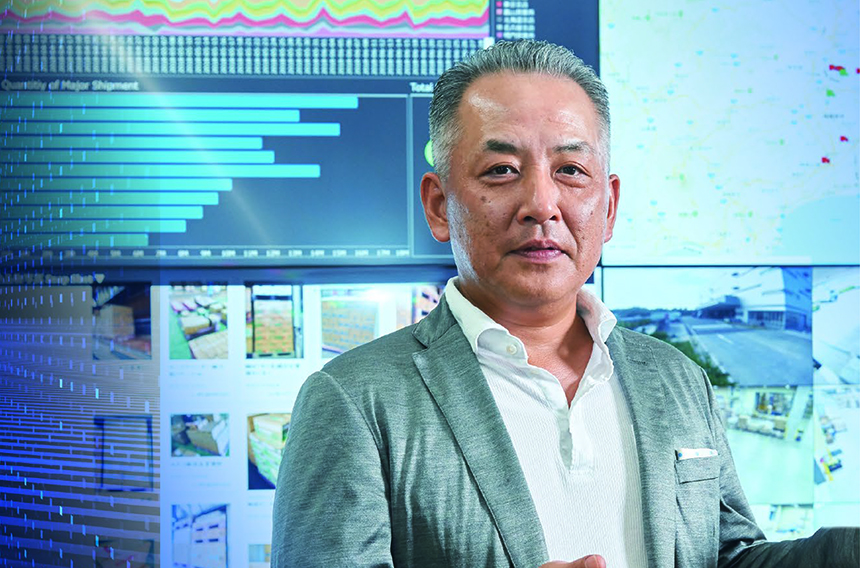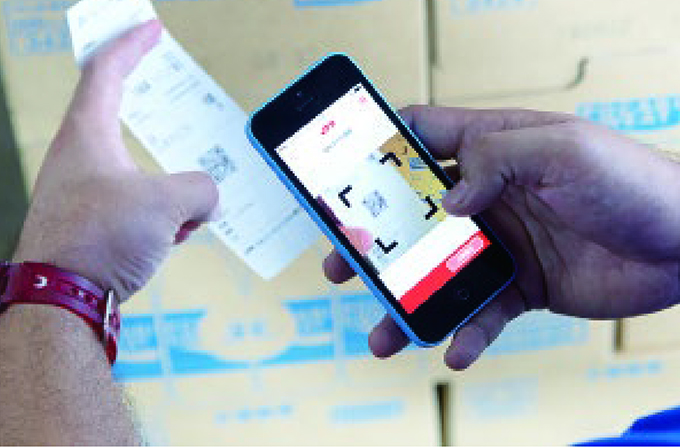Otsuka Warehouse Co., Ltd.
The future of logistics that begins with the digitization of pallet vouchers
*The information at the time of publication in October 2018 posted as it is.
*The company names and product names mentioned are registered trademarks or trademarks of their respective companies.
"I want you to do something because it takes time to manage and process paper vouchers."
These words from Otsuka Warehouse Co., Ltd. led to the service release of the "pallet voucher digitization service."
We asked Mr. Kazuhiko Hamanaga, the company's President, who was the first user of the service, about his involvement with JPR, the changes seen since the introduction of the service, and the future outlook.

Mr. Kazuhiko Hamanaga, President, Otsuka Warehouse Co., Ltd.
Reviewing pallets started diverse deals
Otsuka Warehouse Co., Ltd. is a company that was founded in 1961 and is responsible for warehousing and transportation related businesses. With distribution centers nationwide, it boasts one of the largest volumes of goods in Japan in the fields of pharmaceuticals, food and beverages, and daily necessities. The Otsuka Group, to which the company belongs, mainly manufactures and sells pharmaceuticals and nutraceutical products for maintaining and improving daily health. Therefore, Otsuka Warehouse Co., Ltd. was originally created for the purpose of providing a stable supply of pharmaceuticals. However, 60% of the company's net sales of about 50 billion yen is now coming from projects from outside the group. "We would only be a cost if we just carried products within the Otsuka group. We would like to provide the logistics know-how we have cultivated and become a company that is well evaluated by the outside." This reason for the increasing external deals was stated by President Mr. Hamanaga.
One of the unexpected successes in our aggressive sales activities was the reconsideration around pallets. "Around 1999, we started to switch from our own pallets to JPR rented pallets. By introducing standard sized JPR pallets that were becoming the standard in the processed food industry including soft drinks, we expected that using the same JPR pallets delivered to the same place would help us gain a foothold for our sales" said President Mr. Hamanaga.
As of the end of July 2018, the JPR type 11 rented pallet shared use/collection promotion association (P-Ken)* had 324 member companies, and the number of annual pallets in operation in 2017 was about 33 million. It has grown to a scale that now defines the infrastructure of the processed food industry.
Preventing personalization and reducing on-site labor
However, as the number of business partners expanded, the types of paper vouchers handled increased dramatically. In addition, the number of JPR pallets handled increased with the number of pallet vouchers.
President Mr. Hamanaga looks back on these issues. "When you step out of the logistics world, you can buy anything with a single credit card. While cash is not a necessity anymore, the logistics industry hadn't changed much in decades, and we were continuing to use paper-based processing. I was wondering if this was all right."
Moreover, paper voucher processing also created problems for organizational management. "There was also the problem of personalization. It was too complicated and there was the situation where only the person in charge could understand. I consulted with President of JPR Ms. Kano about going paperless." We discussed how we could solve this," continued President Mr. Hamanaga.
By eliminating paper vouchers, the load on the driver could be reduced. The final runner of logistics is the driver. It is quite a hassle for the driver to sign and bundle up the vouchers every time the package is handed over. That's why President Mr. Hamanaga decided to work with JPR on a mechanism that could reduce the load on the driver.
An electronic pallet voucher service by JPR made it possible to see the delivery of goods (pallets) in real time. It didn't only reduce the work load for the site, but the work load on office workers (inputting into the “epal” management system, managing storage of vouchers, confirmation of unmatched data, etc.) was also a major achievement. "Currently, it is possible to collate data in real time with a smartphone when things move, so it eliminates the need for detailed work, and the reputation of our partner companies is very high." President Mr. Hamanaga says he is confident introducing the pallet voucher computerization service.
Otsuka Warehouse Co., Ltd. has been promoting business reform by actively incorporating IT technology. The electronic voucher service is becoming an indispensable piece of the company's goal to realize "connected logistics" that connects people and goods.
"I think that JPR is a rare entity that has been developing business with the a focus on standardization and sharing. I hope a unique and individual entity like JPR creates a system that changes the paper-driven industry and matches the movements of things with data in real time to achieve higher efficiency," said President Mr. Hamanaga.
* JPR type 11 rented pallet joint use/collection promotion group (P-Ken): A voluntary organization that promotes integrated palletization of the processed food industry using the JPR type 11 rented pallet and a joint collection system. Established in 1990. April 2019 from "P-Ken organization" as a voluntary organization to "P-Ken system", a business of JPR.
What is the "slip digitization service"?
The electronic slip service is a system that electronically copies pallet slips that were conventionally done on paper, and looks up pallet movement information from a QR code on a smartphone. It is possible to reduce the time required for manual work such as paper management, recording work errors, and collation. The service was released in April 2018.


